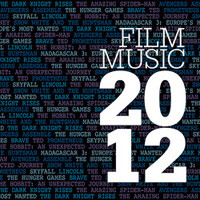- Silva Screen / 2013 / 52m
Silva Screen has continued its now-traditional yearly round up of music from the year’s biggest films with Film Music 2012, a selection of a dozen pieces from a variety of box office hits performed by the label’s usual ensembles, the City of Prague Philharmonic and London Music Works. From my perspective, 2012 was a strong year for film music, better than a lot of recent years, but my own list of favourites of the year features a number of titles from outside mainstream Hollywood – the year’s best music certainly wasn’t heard in the year’s biggest box office hits – so it’s interesting to see how well the album works.
It opens with its biggest surprise, Walter Murphy’s end title cue from Ted. That’s not a score I had heard before, but its old-fashioned combination of infectious melodic music for orchestra, sometimes big band is really nice indeed and it’s a lovely way to start the album. The second biggest surprise is the second track, the instantly-forgettable “New York City Surprise” from Madagascar 3, notionally composed by Hans Zimmer. It’s animation music by-the-numbers; the performance is absolutely fine, the music just isn’t up to much. Much more satisfying music for animation comes in the form of “Fate and Destiny” from Patrick Doyle’s Brave – I found it hard to warm to the whole score (it features a lot of music written in a style which just isn’t to my taste), but it works well in this bite-sized chunk and the lilting central melody is just gorgeous.
I had a similar reaction to John Williams’s Lincoln, represented here by “Freedom’s Call”. I found the score as a whole to be strangely unmoving – though I acknowledge that it has received widespread acclaim elsewhere – but hearing a six-minute piece from the score in isolation (with a nice performance by the CPPO), it does seem to have a touch of class and that unmistakable Williams sheen that isn’t present throughout all the other things on the album. The short suite from James Newton Howard’s Snow White and the Huntsman is pretty nice stuff, serious music but attractive, but it’s far from the composer at his best. Few people will remember anything from the incredibly bland score Marc Streitenfeld wrote for Ridley Scott’s Prometheus – which was outshone by Harry Gregson-Williams’s excellent theme, “Life”, a fine example of contemporary film music and mercifully the film’s representative on this album.
Few film scores in 2012 were as anticipated as Howard Shore’s The Hobbit. “Over Hill”, heard here, includes a nice version of by far the score’s best feature (the “Misty Mountains” theme). The album’s second musical disappointment after Madagascar 3 is “Imagine the Fire” from The Dark Knight Rises, a score that didn’t seem that good at the time and sadly sounds even more banal and borderline amateurish when you hear it in a context like this, in amongst some well-written music by other composers. It’s a shame that eight minutes of the album had to be devoted to something as poor, but entirely understandable given how well the film did. Fortunately things get well and truly back on track with the main theme from Alan Silvestri’s The Avengers; while few people seem to be as enthusiastic exponents of the full score as I, I suspect that even fewer would find a bad word to say about the theme, dynamic and exciting, written by a person not a computer, in painful contrast to its immediate predecessor on this album. Things get better still in “Young Peter” from James Horner’s wonderful The Amazing Spider-Man, a score that proved that despite recent trends towards rubbish like The Dark Knight Rises, you actually can still get away with dynamic, memorable, theme-driven scores for comic book action films, ones that feature – you know – tunes. It’s probably more like a few bags of sand put up to protect against the onslaught of crap than a big wall that might actually stop them, but at least it’s something.
I thought James Newton Howard’s The Hunger Games was probably the most underrated score of the year; while the film’s soundtrack did feature a lot of songs, Howard managed to create a wonderful folksy atmosphere that fitted it like a glove and “Rue’s Farewell” heard here is a moving piece of music by anyone’s standards. The album concludes with an instrumental version of the title song from Skyfall, which works very well in that form. The album as a whole is of course intended far more to be consumed by the average man on the street than the die-hard film music fan, but given its budget price and the generally good standard of music and performance (only two tracks have little to offer), it would make a fine sampler for anyone really who doesn’t already own all the titles represented.
Rating: ***
facebook.com/moviewave | twitter.com/MovieWaveDotNet | amazon.com












Should we look forward to a review of Ted in the future? You seem favorably impressed by it, and I’ve heard the same from a lot of other reviewers.
I’m quite intrigued to hear it now – though there is a lot of stuff I’m quite intrigued to hear, and only a limited supply of money!
‘Notionally composed’ – my new favourite phrase.
Great review! “notionally composed” is a great phrase. Don’t you think you could have backed the bus over Zimmer one more time there, James? 😉
I really like the DKR score. Imagine the Fire is a terrific track. The album is a mixed bag though, I’ll agree.